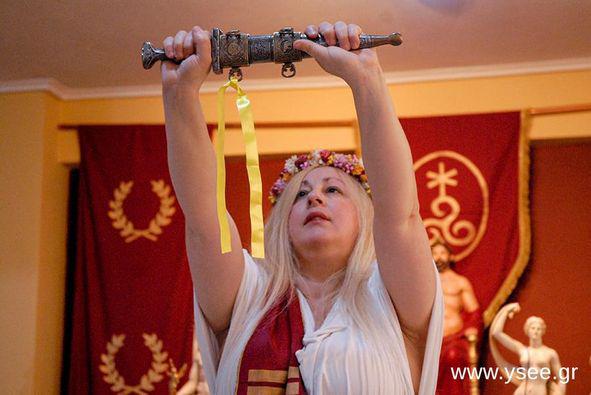https://www.facebook.com/sorisaris/posts/10219015225357124
In one of his lectures, mentioning the cheerful mood that appeared to be prevailing during the laying of wreaths at the statues of heroes on national anniversaries, the astrophysicist Manos Danezis said: “We are happy standing here because we are not in their position. Who would really like himself/herself or his/her children to be in the position of Kolokotronis, or Bouboulina, or Capodistrias? Who would want to be a statue?
Precisely that, the dessicated, empty and desolate mood, the absence of lightness, is what is being reproduced by the Aegina committee for the bicentenary of the Revolution. With the perspective of the world of sales and psychiatry, Capodistrias has become something sleek, like a project for a museum showcase.
The dominant economic and intellectual “elite” of this island, of every political hue and rank, has seized the unexpected lifeline of the Governor’s timeless renown. They borrow a little radiance from the reflected starlight to project it onto the stage of their other-directedness. They feel they are offering something to the collectivity, doing their part towards the common goal, which is nothing other than the promotion of the island.
In Aegina, where the tourism monoculture is already showing its teeth, everything is converted into fertilizer to reinforce it. Everything is an event, serving the purpose of the overall narrative.
What thoughtlessness, in the crucial days, so crucial, that we are living through, to remain stationary in the instant photographs of a time that conditioned our course, up to the present day! It is sad that instead of calling upon history to guide us, instead of exploring the raw material that went to produce Capodistrias, we remain at this: he was a good man, a good Christian, who loved education and had visionary ideas. And above all, he did this in Aegina, the first capital of the “Greek” state. Don’t you believe us? This is the landing place where he first set foot, here is his “throne” in the church, here is the orphanage and here, in this ruin, was the school with the mutual-teaching method. This is where it all happened and this is where they wrecked it all, apart from the church building.
What use is the information that this was the orphanage if we don’t explore the course that turned into a prison, and the island into a place of executions? How did we get from the light to darkness? How can we highlight the “good Christian” and conceal the unbelievable pressure that the Church place on the Governor, for a return of the rayah into the arms of the Sultan? (Letters of the patriarch Agathangelos. An inspiration which came back onstage live, with the federalizing of Greece and Turkey by the Papadopoulos of the Greece of Hellenic Christians.) How can we speak of the Governor’s love of learning when we also content ourselves with the educational misery of the present day? Why do we snicker behind our beards over the potato story while at the same time hiding what situation and which people led the Governor to an action of this kind? Why was the work of such an important person instantly demolished after his assassination?
Who could be proud of this humiliation?
Who today would risk the expense of spirit that would be required to become the Odysseus of Metis, to find the way to bring Capodistrias’ visions into the living present? Who would want to take on his enemies? Who would denounce them, even just for the sake of the historical truth? Who wants to consecrate his existence to the idea of civilization? How, really, does the educational community of this island in practice honour Capodistrias’ contribution to learning? How, really, do the municipal authorities of this place perceive the functioning of the institution they serve, through the teachings and the vision of the Governor? There are a lot of “how reallys” and we know that the answers can be given only by sworn Carbonari, as Capodistrias was.
Who will make Capodistrias a possession of the community? Who, fellow citizens, wants to be a statue?
The Temple of Aphaia, we learn, is once more bestowing its light on a celebrated Hellenic musical composer, whose name is being kept a seven-sealed mystery, to keep it a surprise.
P.S. If really it is firsts that interest you and so much attract your attention (first capital), we can inform you that this place that so generously accommodates us holds a first from antiquity, from the time when the venerable Aiakos reigned in Aegina, when he climbed to the peak of the Ellanion mountain to offer a libation to PANELLENION ZEUS, in the age when the co-ordinates were set for what we call the Hellenic Nation.
